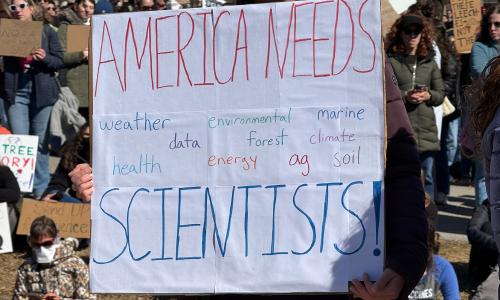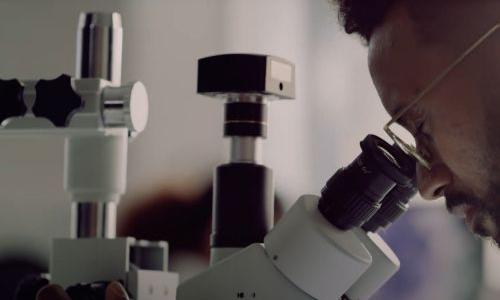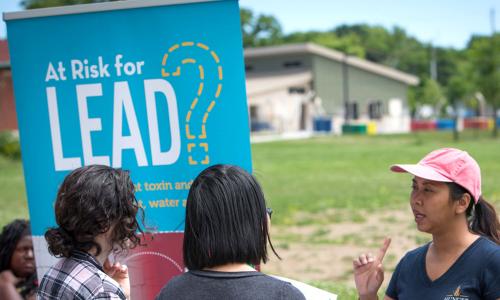The Trump administration is relentlessly attacking science as part of its effort to suppress or eliminate any facts, data, or evidence that undermine its narrative or agenda.
The good news is that we can do something about this authoritarian attempt to control information—and that many courageous scientists are already stepping up and taking action to counter this threat.
History tells us that a key strategy for countering authoritarianism is to establish science infrastructure outside of government and ensure that essential science continues and remains available for those who need it.
UCS is proud to be a leader in this effort and is actively building and supporting a network of scientists and aligned groups who are working to secure and advance crucial scientific work, regardless of the actions of the Trump administration. This includes providing scientists and science supporters with in-depth resources for establishing or supporting an independent science advisory committee.
Here we highlight some of the many independent science efforts currently underway that showcase the growing strength and reach of this developing initiative.
Sustaining independent science advice
- Safeguarding the US Census Process: The all-volunteer Independent Census Scientific Advisory Committee was formed in 2025 after the Trump administration disbanded the Census Scientific Advisory Committee. Its members are giving their time and expertise to ensure that they can inform decisionmakers—including submitting their recommendations to the US Census Bureau—and counter disinformation in the public sphere.
- Highlighting Science for Environmental Justice Efforts: Former members of the EPA’s National Environmental Justice Advisory Committee (NEJAC) have kicked off the NEJAC Media Project to highlight stories about the value of NEJAC’s work, including the 2024 recommendations to EPA on Reducing Cumulative and Disproportionate Impacts and Burdens in Environmental Justice Communities. They have created a video series that is part of a larger oral history project featuring voices from the environmental justice movement.
- Ensuring Evidence-based Vaccine Schedules: The University of Minnesota Vaccine Integrity Project will produce vaccine evaluations and clinical guidelines based on rigorous and timely reviews.
- Providing Expert Advice on Climate Change and Public Health: National Academy of Sciences Study on Climate Change: The National Academy of Sciences fast tracked a study of climate impacts on public health in the wake of the EPA’s announcement that it planned to rescind its Endangerment Finding.
Safeguarding data, research, and science-based tools
- Monitoring Federal Statistical Product Releases: The American Statistical Association is leading a Citizen Science project to help track changes in federal statistical data releases. By mobilizing the expertise of the data-user community, the project aims to provide a sustainable mechanism for identifying both improvements and potential deterioration in federal data products, ensuring greater visibility and responsiveness in support of evidence-driven decision-making.
- Continuing the Federal Employee Viewpoint Survey: The Partnership for Public Service is conducting the Public Service Viewpoint Survey, an independent federal employee survey designed to better understand workforce perspectives, identify opportunities for improvement, and inform evidence-based decisions about workplace policies. This effort will fill a critical void left by the Office of Personnel Management’s cancellation of the 2025 Federal Employee Viewpoint Survey, despite it being required by law. The deadline for federal employees to complete the survey is December 19, 2025.
- Preserving Reliable Climate Information: The former National Oceanic and Atmospheric Administration leaders that ran the now-shuttered Climate.gov have launched Climate.us to ensure reliable climate information—including timely data on sea level rise and other effects of climate change—continues to reach the general public.
- Hosting Climate Literacy Resources: Climateliteracy.earth provides access to government and partner organization resources that can help build climate literacy in schools, workplaces, media, communities, and with the general public. The US Global Change Research Program’s Climate Literacy Guide is now hosted on this website.
- Continuing Disaster Risk Analysis: After it was discontinued by the National Oceanic and Atmospheric Administration (NOAA), Climate Central worked with the former lead scientist to host and continue to update the Billion Dollar Disaster analysis to monitor the growing risk of weather and climate-related disasters in the United States.
Building independent science communication hubs
- Creating a Hub on Climate Open Data: The Data Foundation’s Climate Data Collaborative serves as an independent hub bringing together diverse stakeholders and leveraging open data to ensure climate solutions rely on the best greenhouse gas emissions data and that progress can be effectively measured.
- Partnering for Science-based Vaccine and Immunization Recommendations: Medical associations like The American Academy of Pediatrics are creating their own guidelines and advice on children’s immunization schedules. Several US states in the Northeast and West have created regional public health coalitions to make vaccine recommendations and coordinate public health efforts.
Providing opportunities for independent scientists to convene and publish
- Advancing the work of the National Climate Assessment: The American Geophysical Union and the American Meteorological Society will publish papers on topics that would have been covered by dismissed authors of the National Climate Assessment. Historically, this report by the US government has served as a guidebook for decisionmakers, providing the best available science on climate change and how to protect people and public infrastructure from its impacts.
- Continuing the National Nature Assessment: United by Nature will revive and reimagine the National Nature Assessment that was unceremoniously shuttered, producing the most comprehensive review to date of the importance of nature to humans.
- Assembling Transportation Equity Experts: A group of independent transportation scholars, practitioners, advocates, and activists working toward an equitable and just transportation system have organized a January 2026 event, Crossroads: A Transportation Equity and Justice Convening, to share ideas, energy, and connection around ongoing transportation needs and a shifting political landscape. This event coincides with the Transportation Research Board's annual meeting and is related to TRB’s restructuring to exclude climate and equity-oriented research.
A proven strategy for addressing an urgent need
UCS has documented the harms of abandoning science advice during previous administrations, including President Trump’s first term. It has also worked closely to support scientists seeking pathways to sustain their scientific work, including by setting up independent advisory committees.
In October 2019, UCS convened the Independent Particulate Matter Review Panel after the EPA disbanded its official Clean Air Scientific Advisory Committee (CASAC) PM review panel. This group of 20 volunteer scientists issued recommendations finding that the current standards for particulate matter were inadequate to protect public health and should be strengthened, ensuring that the best available science remained available to both decisionmakers and the general public.
Do you have additional questions or information to share about independent scientific work currently underway? Email us at independentscience@ucs.org.




